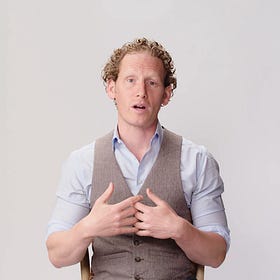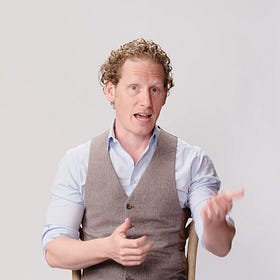Learn from the minds that matter.
Introducing our latest Big Think+ expert class.
Unlock the magic of language to increase your impact with Jonah Berger
When we learn grammar in school, we’re not always taught the degree to which language is power. Marketing professor Jonah Berger argues linguistics (i.e., the study of language) can help you fit in with colleagues, be more persuasive, engage others, positively influence behavior, and make others feel heard. In today’s world, we even have more advanced and automated language analysis tools and Berger’s SPEACC Framework, which shows us how paying attention to the words we use can elevate our communication skills.
Berger is a Wharton School professor and internationally bestselling author of Magic Words, Contagious, Invisible Influence, and The Catalyst. In this video lesson, Berger explains his theory on influencing others with linguistic shifts.
Learning Objectives:
Use language to build connections and make others feel heard
Engage people’s attention and increase your persuasion power
Influence behavior with identity-based words
Leverage confidence and deflect unfair questions
Recognize the power and influence of tiny words
Subscribe now to continue learning
Learn skills from the world’s top thinkers, entrepreneurs, and experts. Our micro-learning classes help you stay focused on big ideas with practical impact.
By subscribing to the Big Think Substack, you can gain access to lessons from this expert plus past and future subjects.
Lessons:
Lesson 1: The SPEACC Framework
Public speaker Mohammed Qahtani once said, “Words have power, words are power, words could be your power also.” Marketing professor Jonah Berger agrees — he argues that studying language provides invaluable data-driven insights. You can gather information about your colleagues, audience, or customers (and vice versa), allowing future behavior and outcom…
Lesson 2: Similarity and Difference
Your best friend always says “Geez Louise!” after making a mistake. Suddenly, you spill coffee in your lap and hear yourself yelling their catchphrase. According to marketing professor Jonah Berger, we tend to conform to the language norms around us, and the degree to which someone enculturates linguistically at work can be especially telling.
Lesson 3: Posing Questions
American author Dale Carnegie wrote, “No one likes to feel that [they’re] being sold something or told to do a thing. We much prefer to feel that we are buying of our own accord or acting on our own ideas.” So when you want to persuade someone of something, you may want to tread carefully. According to marketing professor Jonah Berger, if — instead of t…
Lesson 4: Emotions
Have you ever been so engrossed by a book that you stay up late plowing through chapters just to see what the main character will do next or because you’re relating so much to what they are experiencing? That’s the power of story — it pulls you in and keeps you engaged.
Lesson 5: Agency and Identity
If someone says, “I run,” you might assume they go for a casual jog once a week. If they tell you, “I’m a runner,” now you might imagine they run long distances several times a week, sign up for regular races, and are incredibly loyal to a specific sneaker. These seemingly similar statements result in different images of behavior. According to marketing…
Lesson 6: Confidence
Who are you more likely to follow? Someone who boldly declares, “I know exactly how to get there” or someone who shrugs, “I think I might know how to get there”? Even if it turns out the second person actually had a better sense of the directions, according to marketing professor Jonah Berger, people are more likely to choose the first person simply bec…
Lesson 7: Concreteness
Have you ever asked a teenager, “How was school?” and heard “Fine” in response? Did you then try, “What did you do?” only to be met with “Stuff”? If so, then you know a lack of concrete language can come off as a lack of engagement. Just as being abstract doesn’t land well at the dinner table, it also doesn’t get you very far in customer service or mark…
Lesson 8: Handling Unfair Questions
With a lightning-fast flick, Wonder Woman can ricochet enemy bullets off her indestructible wrist cuffs back toward the shooter like boomerangs. Wouldn’t it be cool if you could do the same thing when someone shoots an unfair question your way?
Lesson 9: The Big Effects of Tiny Words
When resolving a conflict, you’re often advised to use “I” statements (i.e., “I felt X,” not “You made me feel X.”). But when consoling a friend, it’s suggested you focus on the “You,” not “I” (i.e., “That must have been very hard for you,” instead of “I know how you feel.”). Pronouns are little, but their use and context make a big difference in how ot…
Lesson 10: The Benefits of Seeking Advice
Sometimes you might hesitate to ask a colleague or mentor for advice. Maybe you don’t want to burden them. Or maybe you don’t want to admit you’re unsure or appear needy. What if seeking advice makes you look bad? But … what if it makes the other person feel … good?



















Share this post